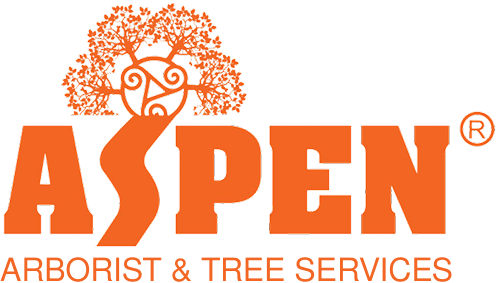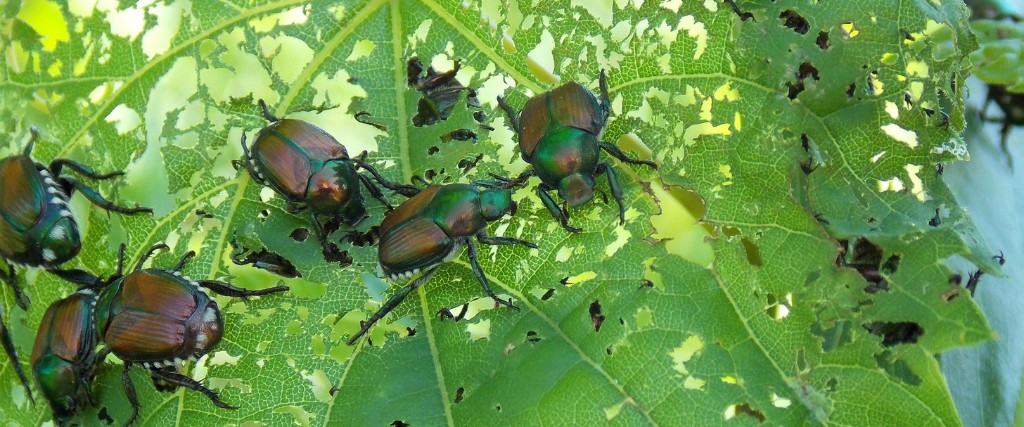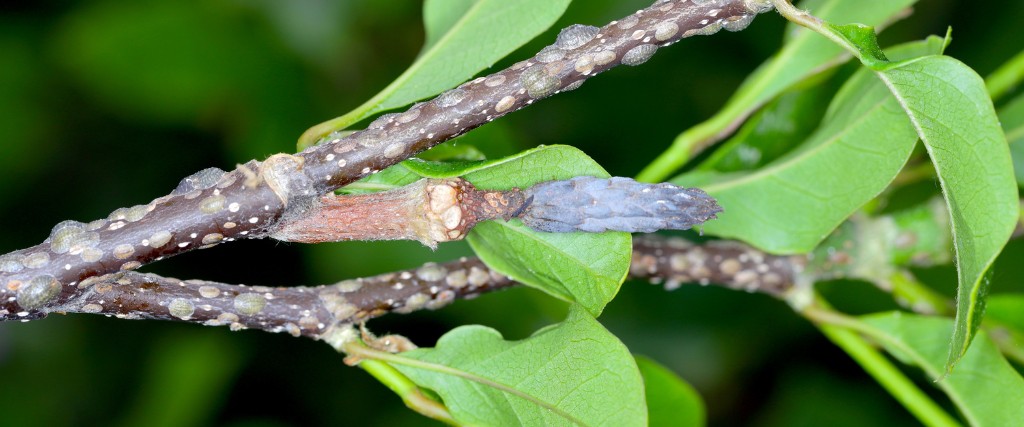You’ve probably had it happen – someone shows up at your door with a clipboard, promising their mystery spray will wipe out every insect on your property in one go. The truth? Sometimes the biggest pest is the one making the sales pitch.
These “spray and pray” tactics might sound convenient, but they rarely solve the real problem – and can actually do more harm than good. We’ll explain why integrated pest management (IPM) is a smarter, more effective way to protect your trees from common insect issues in Northern New Jersey.
Key Takeaways:
- Integrated pest management (IPM) offers a holistic approach to controlling tree pests. Instead of indiscriminate spraying, it combines biological controls, cultural practices, mechanical methods, and targeted chemical treatments.
- IPM creates customized pest management plans for each property, recognizing that different trees and landscapes face unique pest challenges that require specific treatment approaches.
- Using IPM is safer for families and pets since it reduces chemical exposure in your yard by using targeted applications only when necessary.
- Timing treatments to coincide with vulnerable stages in pest life cycles dramatically improves effectiveness compared to general spraying on a predetermined schedule.
- While IPM may have higher upfront costs, it saves money long-term by preventing pest establishment, reducing the need for repeated treatments, and using fewer chemicals than “spray and pray” tactics.
What Is Integrated Pest Management?
Tree insects are one of the most significant summer stressors of Northern New Jersey trees. Pest damage can range from harming the aesthetics of your tree to outright killing it. To counter this problem, many arborists turn to integrated pest management (IPM).
IPM is a more holistic approach to controlling the population of tree insects on your property. Instead of indiscriminately spraying chemicals and hoping they take care of the problem, IPM involves creating a unique plan to deal with tree insects.
PRO TIP: If you’d like to learn more about the pests we have to deal with in Northern New Jersey, see our guide that provides an overview of some of the most common tree insects and how they harm your trees.
The four key elements of a comprehensive IPM plan include:
- Biological Controls: Introducing or encouraging natural predators of tree insects, like lady beetles, birds, and predatory mites, can naturally control pest populations. These predators will keep the insect population low enough that they can’t establish and damage your trees.
- Cultural Controls: Cultural controls involve planting grass and trees that are less prone to pest attacks. For instance, if your area is experiencing an increase in southern pine beetle activity, consider planting alternatives to pines in your yard. Alternatively, you can look for insect-resistant cultivars of your favorite species to protect your landscape.
- Mechanical Controls: Sometimes, you have to get your hands dirty when dealing with insects. Handpicking insects and eggs off of plants and destroying them, setting traps, and spraying water to dislodge insects are simple and cost-effective ways to protect your trees.
- Chemical Controls: Contrary to what you might think, insecticides are still part of an IPM program. However, instead of spraying indiscriminately, IPM advises using targeted treatments appropriate for each pest and avoiding harming beneficial insects.
The Benefits of an Integrated Pest Management Plan
There are several benefits of working with a tree care company that offers IPM rather than general spraying.
Customize Pest Control to Fit Your Unique Landscape
Look at your yard and then take a drive to a neighboring town and look at their properties. You can probably spot plenty of differences between the two. With the unique landscape and variety of tree species to plant, why would you try to use a one-size-fits-all approach for pest control?
“Many companies advertise general spraying and claim it will fix all your insect problems. But a general approach will not target the pests you’re most likely to have trouble with. A homeowner with apple trees will have different insects to contend with than one with hemlocks. Everyone’s yard is different, and their pest management strategies also need to be.” – Casey Walentowicz, Aspen Tree Owner and ISA Certified Arborist
IPM takes into account the unique properties of our area and your landscape. The team will work with you as early as possible in the spring to develop a plan for administering treatments that target the pests you are most likely to see.
Protect Children and Pets with Safer, Targeted Treatments
Extensive insecticide spraying sounds good until you remember that you have to take your dog out or your children want to play outside. With chemicals all over the yard, it isn’t safe to let them outside.
IPM uses more limited and targeted treatments to control tree insects. Instead of an unusable yard after spraying, you may only have one tree that you need to keep pets and children away from temporarily.
Target Pests When it is Most Effective
When a company offers general spraying and does a whole neighborhood in one day, it may only be effective for some houses in the area and not others. Each property has different trees and pests that they’re dealing with. Most importantly, the timing for treatment of each will differ significantly.
Take scale insects for example. There are many different types of scale, and each one has a specific time when treatment works best. To be effective, insecticides must be applied during the insect’s “crawler” stage – when the young insects are moving and most vulnerable. That’s why it’s important to have a professional who understands the timing and life cycle of each pest.
When the crawler period occurs will depend on the species and the weather we’ve experienced so far this year. Spraying at whatever time is most convenient for the company, rather than what is necessary to counter the insect, won’t get the job done. So, while you may be spending money to try and prevent scale from attacking your trees, you may end up seeing the trademark bumps on your tree indicating scale insects.
IPM uses local data to determine the best time to treat your trees for maximum effectiveness.
Save Money with Long-Term, Targeted Solutions
IPM programs often have a higher upfront cost associated with them, but they can save you money in the long run.
If someone comes and does general spraying on your property, they might have the timing right to deal with one species of insect but not others. You might notice some pests flying around, so you have them come back to treat your property. The second general treatment won’t eliminate all the pests, and you’ll need to repeat the process with another round of general spraying. The costs will quickly add up.
An IPM plan uses targeted treatments along with natural methods to keep insect populations under control and stop them from taking hold in the first place. Because it focuses on precision—not overuse—you’ll spend less on insecticide treatments, and fewer chemicals will be needed compared to the typical “spray and pray” approach.
Frequently Asked Questions About Integrated Pest Management
Integrated pest management is one of the most important things you can do for your yard to combat tree insects, but it’s one service that homeowners know very little about. We’ve answered some of the common questions we get from homeowners about it and how to protect your landscape.
What are some of the common pests we deal with in Northern New Jersey?
The tree insects you’ll need to worry about will depend on where you live in Northern New Jersey and what trees you have. Some species to monitor for include:
- Aphids
- Spider mites
- Japanese beetles
- Spongy moths
- Bagworms
- Hemlock woolly adelgids
Can I use pesticides myself, or do I have to have a professional spray them?
The New Jersey Department of Environmental Protection permits homeowners to use general-use pesticides, while only a licensed applicator can use restricted-use insecticides. It is best to let a professional handle any spraying, as they will do it at the right time and use the appropriate chemicals for the job.
What parts of integrated pest management can I do myself?
There are plenty of aspects of IPM that a homeowner can handle themselves, such as:
- Monitoring for signs of insects
- Placing insect traps
- Introducing beneficial insects or encouraging birds
- Destroying egg sacks
However, this is often not feasible on a large property because of the time it would take. Additionally, you won’t be able to use more targeted insecticides. When you can’t handle IPM or don’t have the time, leave it to the professionals.
Does IPM use organic treatments?
Yes, IPM plans typically use organic treatments as well as chemicals. These organic methods include things like certain horticultural oils and neem oil.
Protect Your Trees – and Your Wallet – with a Customized IPM Plan from Aspen Tree
If you’re tired of wasting money on guesswork and still seeing pests around your property, it’s time for a smarter solution. Integrated pest management gives you targeted, effective results – without coating your entire yard in chemicals.
At Aspen Tree, we don’t spray first and ask questions later. Instead, we start by assessing your property, identifying the specific pests you’re dealing with, and designing a personalized treatment plan based on timing, biology, and your landscape’s unique needs. Call us today at 201-939-8733 or request a quote online.








